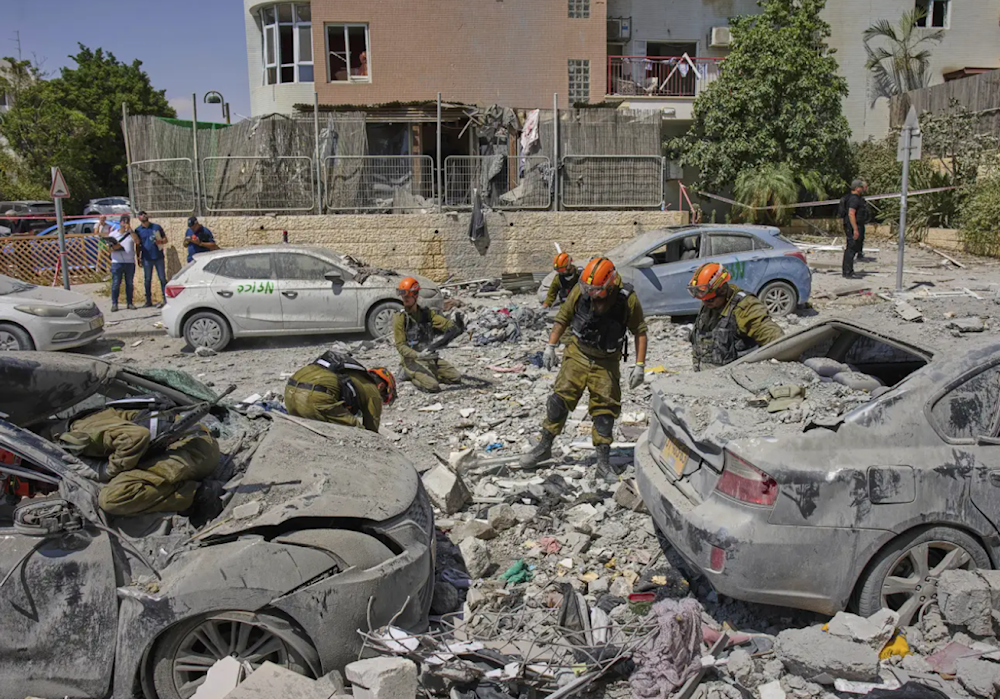Israeli censorship hindering assessment of damage from Iranian strikes
During its 12-day war on Iran, "Israel" was impacted by over 50 missiles, but the true extent of the damage remains obscured due to intensified censorship that restricts media coverage.
-

Israeli soldiers work amid the rubble of residential buildings destroyed by an Iranian missile strike that killed several people in Beersheba, occupied Palestine, on June 24, 2025. (AP)
"Israel" has admitted to being struck by more than 50 missiles during its 12-day war with Iran, but the full scope of the damage may never be revealed due to strict press censorship.
Such media restrictions are long-standing in "Israel," where any content, written or visual, considered potentially harmful to the vaguely defined notion of “national security” can be legally suppressed.
Recently, the Israeli regime has further tightened its grip on wartime reporting.
Last week, Israeli police cut off broadcasts by multiple foreign news agencies reporting from locations hit by Iranian missiles, while footage published by The Times of Israel showed an Israeli police officer demanding that a cameraman surrender his recording equipment.
Israeli police stormed the offices of foreign TV news teams following their coverage of missile strikes in the Haifa region, which reportedly hit sensitive military sites.
Censorship intensifies amid military setbacks
Under current regulations, any footage or reporting from a “combat zone or missile impact site” must receive prior written approval from the military censor, according to the Israeli Government Press Office, which also oversees journalist accreditation.
The rules are especially strict when missile strikes hit near sensitive sites such as military installations, oil refineries, or other strategic infrastructure.
Jerome Bourdon, a professor of media sociology at Tel Aviv University, stated, "We probably will never know the full extent of the damage."
According to Bourdon, the increasingly restricted media environment is "a very clear desire to reverse the narrative", noting that the war with Iran comes as "Israel" faces growing global condemnation for its ongoing aggression on Gaza, which has killed tens of thousands and sparked a severe humanitarian crisis.
Suppressing coverage and targeting foreign media
During the war on Iran, media coverage near Israeli civilian missile strike sites was frequently restricted, with foreign journalists often barred from filming wide shots or identifying exact impact locations.
In one incident in Ramat Gan, police halted a live broadcast by two Western news agencies filming a damaged building, suspecting they were sending footage to Al Jazeera, an outlet banned by "Israel." Police justified the action as preventing the airing of "illegal content" under the directives of far-right Police Minister Itamar Ben-Gvir.
Ben-Gvir, known for his hardline stance and inflammatory rhetoric, vowed on June 16 to crack down on anyone seen as "threatening national security." Communications Minister Shlomo Karhi echoed this, declaring "zero tolerance for those who help the enemy."
Critics argue such actions exceed legal boundaries and are driven more by political posturing than legitimate security concerns. “They often make a lot of noise to score political points,” Tehilla Shwartz Altshuler of the Israel Democracy Institute told AFP.
Media scholar Jerome Bourdon added that the ministers' hostility appears directed not just at foreign press but also at Israel's own liberal media.
Despite these concerns, the Government Press Office reiterated its commitment to press freedom, stating it does not discriminate between Israeli and international journalists.

 3 Min Read
3 Min Read










